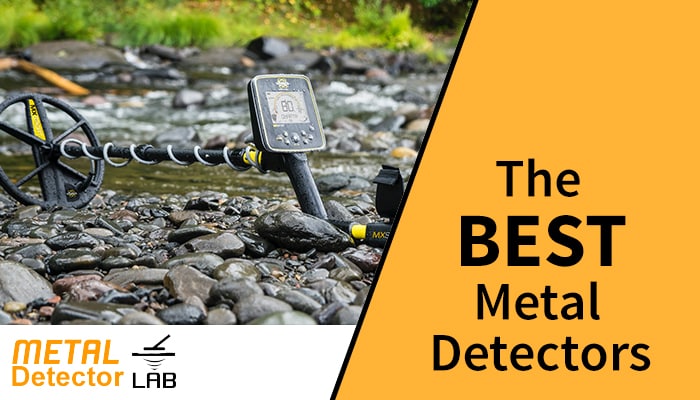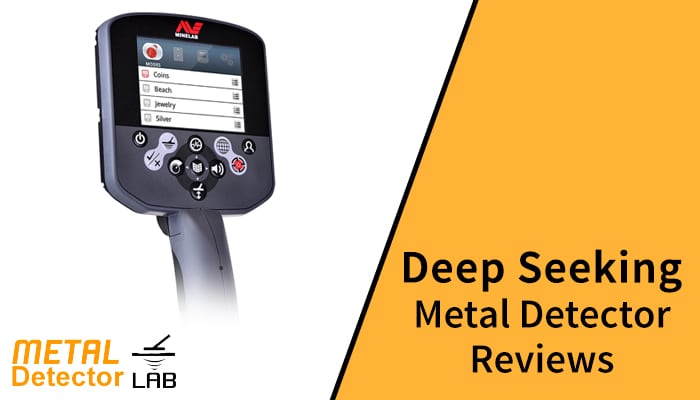Best Metal Detectors for Beginners
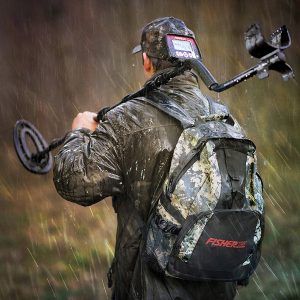
If you are a beginner at metal detecting, it's important to learn the basics first.
Metal detectors can find coins, jewelry, and other items of value buried at beaches, parks, and other places. To detect the treasure you hope to find, you want to find the best metal detector for beginners.
Metal detecting is not only a hobby, but it's also easy to get hooked on the experience of hunting for treasure and many people take it very seriously or even become full-time treasure hunters. You will need patience, research, and good equipment that is easy to use.
Top 6 Metal Detectors for Beginners
There are so many metal detectors available that it can be hard to choose the right one, so we created this buyer's guide for the best metal detectors for beginners. Below we have a list of the best beginner metal detectors to help you choose the best one for your treasure hunting.
We have tried to include the most information possible in each metal detector review below. Each metal detector was chosen for this guide because it offers unique advantages to novices just starting to experience the thrill of metal detecting.
1. Garrett Ace 300
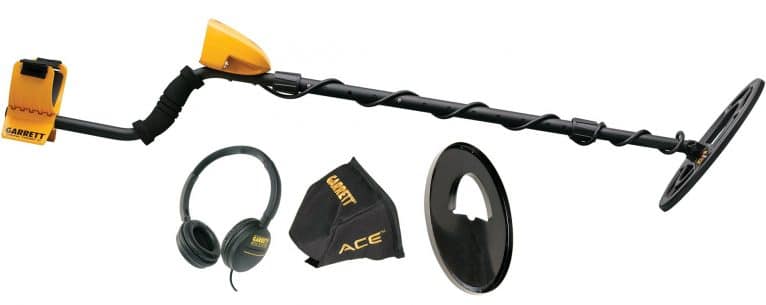
- Adjustable Notch Discrimination
- Upgraded Search Coil
- User-friendly and Economical
- Integrated Pinpointing
- 8 Depth Adjustments
- Depth Indicator
- No adjustable ground balance
- No iron audio
- Not for wet conditions
Garrett makes the ACE 300 metal detector, which has exceptionally good features for beginners. The Garrett ACE 300 is a powerful, solidly built, lightweight, easy to learn metal detector that is among the best entry-level models available.
The detector is the combination of quality, accuracy, and simplicity that makes the Garrett ACE 300 the best metal detector for a beginner.
The most notable feature of this detector is the interface, which is sophisticated enough to engage the more serious hobbyist yet simple to learn.
This unit is designed for finding jewelry, coins, silver, and gold. The Garrett ACE 300 is the next level up from the ACE 200 metal detector with digital target ID to correctly identify the class of target found, and 5 search modes to pinpoint the exact location of the signal.
The primary limitation of this Garrett metal detector is that it uses a single frequency, and is not as suitable as the Garrett AT Pro for metal detecting in wet conditions. With the ground balance set permanently, it will work poorly over very moist areas, wet sand, or in water. Garrett AT detectors are the next major step up in capability and perform well over wet sand and soil.
If this isn't an issue for you, this metal detector is great on dry sand and for use in normal conditions.
The coil is waterproof so it can be submerged and used for detecting metal in shallow water, just not through wet soil. It is essentially the sudden change in the density of the medium the detector is scanning that makes this more difficult.
This is an exceptional machine with a weight of only 2.8 lbs, which makes it quite light and easy to maneuver.
You can read more about it in our review of the Garrett ACE 300.
2. Fisher F22 Metal Detector
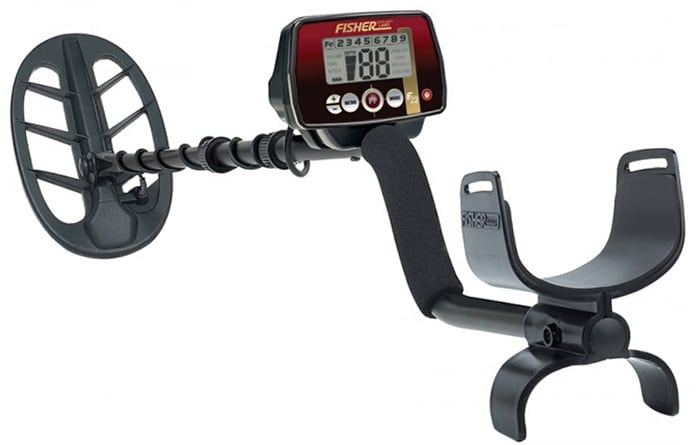
- Great weather resistance
- Pinpoint feature
- Adjustable sensitivity levels
- Detects gold over 9" deep
- Fast recovery speed
- No backlight
- No manual ground balance
The Fisher F22 was almost the best metal detector on this list for beginners. Fisher makes the best “turn on and go” detector suited for entry-level users and is recommended for kids who should not be bogged down trying to understand technical settings.
It is a strong and reasonably well-rounded metal detector for gold, coins, jewelry, and relic hunting.
There are 10 different sensitivity levels available to control this metal detector.
I love this unit because of its lightweight, simple design, and energy efficiency. It can be powered with only 2 AA batteries. The high-quality VDI readout helps you easily determine what you have found.
The pinpointer works well on this metal detector, however, it only works when the pointer button is held down. Though not a big complaint, you will notice these details when compared to more full-featured (and more expensive) products on this list.
The Fisher F22's smaller and more slender submersible coil is great for isolating targets close to trash and is fine for use in shallow water. Do bear in mind that, although this product is weatherproof, the control box is not submersible.
Fisher uses different tones to signal what type of target you may have found and provides more information with Target Category ID Numbers that you can read with a quick look at the LCD screen. The Fisher F22 iron audio feature permits you to exaggerate signals so you will be able to save your time by not digging up unwanted targets.
Fisher has upgraded the electronic equipment which allows for quicker processing and recovery speed. It also lets you customize your settings and save the configuration, so you don't need to worry about losing your settings when you turn off the metal detector.
Overall the Fisher F22 is a great metal detector and offers the best value for the money. Whether you're an amateur or need a backup detector, the Fisher F22 would be superb.
To learn more, read our full Fisher F22 review.
3. Teknetics EuroTek PRO
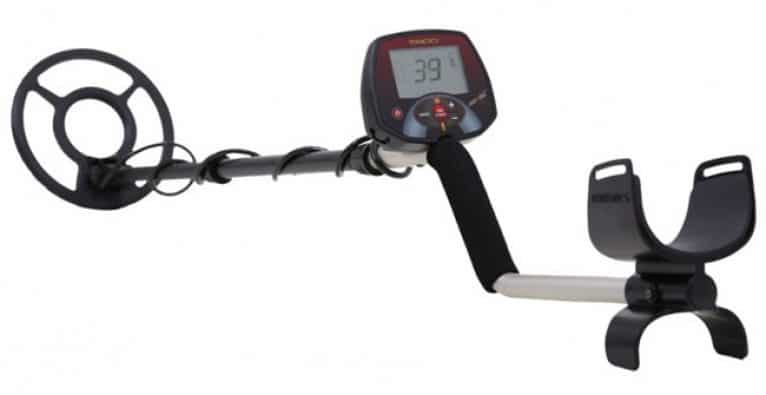
- Iron indicator
- Waterproof coil
- Alert specific to iron
- Fast recovery speed
- Well balanced
- FeTone variable discrimination
- Great target separation
- 25% heavier than #1 choice
- Doesn't estimate depth accurately
- No digital target ID
- Preset ground balance
The Teknetics Eurotek Pro is a very full-featured metal detecting device with superior iron separation to easily tell the difference between ferrous and non-ferrous targets close to each other. With an adjustable iron audio feature, combined with the displayed target ID, it is easier for the user to not get distracted with targets which are unlikely to be valuable.
The machine has an 8″ concentric waterproof search coil to detect objects 9.5″ deep when set to the highest sensitivity setting. The Teknetics Eurotek Pro has ten sensitivity levels as well as variable discrimination so you will know if an object is likely to be valuable.
Once you have started digging, it features a pinpointer to accurately locate the position of the object detected.
The Eurotek Pro runs on a 9-volt battery which will give you 20 to 25 hours of detecting before you have to change the battery.
The Eurotek Pro has a 5-step depth indicator ranging from 2.5 inches to the maximum detectable. We also found it to be fairly accurate even when approaching that maximum.
4. Bounty Hunter Land Ranger Pro
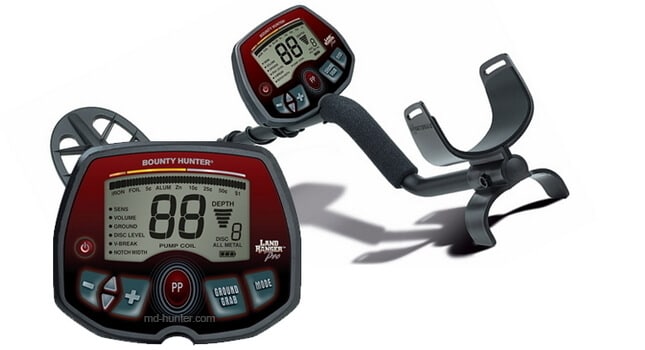
- Depth Indicator
- Integrated Pinpointer
- 7 Search Modes
- Automatic Ground Balancing
- Not waterproof
- Target ID is unreliable
- Price is high considering features
The Bounty Hunter Land Ranger Pro has an 11″ DD waterproof coil, adjustable sensitivity, discrimination, and variable tone breakpoint as well as a 1 button ground balance and 7 searching modes.
The Land Ranger Pro also has a large backlit display and fully programmable touchpad controls. While still great for beginners, it provides a lot more control and features than some options above.
There are 43 Target ID icons, 3 for iron alone, and 100 numerical target ID's. For those of us who would rather have more information before we start digging, this can be great!
There is also a 5 level depth indicator as well as a pinpoint setting to display an estimate in inches.
These features make it suitable for a range of users who are still becoming acquainted with metal detecting, and it is one of the best metal detectors for the money.
The Bounty Hunter Land Ranger Pro metal detector comes with a 5-year warranty
5. Bounty Hunter Gold Digger
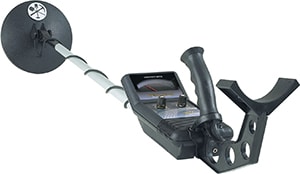
- Extremely simple
- Realiable
- Cheap
- Bare basic features
- Uses 40 year old technology
This is a simple old-style bare-bones metal detector like we had in the 1980s, with 2 knobs and an analog needle on the meter.
The bottom line is, it just works. It's simple, inexpensive, and effective. You won't get lost in the controls, or have something set wrong and walk right over a gold nugget.
For this simplicity, you will have to sacrifice a lot of features that do help in the identification of what you might have found. You will detect them with this, just like you would a high-end metal detector, but you will have no indication of whether you have found gold, silver, a quarter, or an old beer can.
If those limitations don't bother you, this is an easy and straightforward metal detector. In addition, it's made in the USA and can detect coins 6 inches deep and bigger targets as much as 24 inches deep.
6. Bounty Hunter Junior (TID)
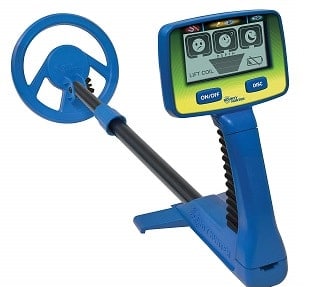
- Kid-friendly interface
- Easy to learn
- Teaches fundamentals of metal detecting
- Not for serious metal detecting
As the name suggests, this is one of the best lightweight metal detectors for kids beginning to have an interest in detecting.
It is super light (1.5 lbs) so it can be used for a considerable amount of time and its pole is adjustable (from 20.5 to 31.5 inches) for comfort.
Having only a single tone the volume gets louder as the user gets closer and the signal gets stronger. Headphones should be used to pick up subtle differences.
The Bounty Hunter Junior (TID) has good entry level sensitivity and discrimination, though it is locked in an All-Metal mode which identifies all types of metal inside the detectable range with no way to discriminate between them.
The model is well worth the cost and is among the best starter detectors for kids. To learn more, read our full Bounty Hunter Junior review.
Tips for Buying a Beginner Metal Detector
If you want to get the most out of your metal detector and ensure you won't be disappointed in the experience, it's important to consider these tips before metal detecting for the first time.
Consider Where Your Metal Detector Will Be Used Most
It seems obvious, but consider where you are more likely to find objects of value with your new metal detector.
Good places to start are busy beach areas, beside well-traveled paths, under and around elevated walkways, and desolate beach areas after heavy storms.
Budget
Even as a beginner, it can be worth buying a more expensive metal detector with good target identification features. Spending just a little extra money at the beginning can save hours of digging up bottle caps and tin cans.
This is why the Garrett metal detector is #1 on our list of beginner metal detectors, above. Garrett makes good detectors that can tell the difference between gold and tin, and they can help you find what you want.
Beginner Tips
Dig Up Everything
Until you learn enough about how to read your machine to feel certain than a beep is a bottle cap instead of gold, it's best to dig up everything you detect.
This is safe for not missing anything, but this practice also helps you learn to read how your machine reacts to each item. Low-cost detectors can also have a great deal of difficulty discriminating between pull tabs and gold. It's an unfortunate reality that few reasonably priced detectors can overcome and is the main reason that an advanced or experienced detectorist will want to use machines with multiple frequencies.
Avoid High Trash Areas
While it is true that high traffic areas like busy sections of a beach can result in getting a lot of hits, 95% of these hits will be junk. So many new users jump into hunting in these areas and then become discouraged after getting one bad reading after another.
Remember, you want to look where high-value items or relics may have been lost. Focus on that and you will find real success much more quickly.
Fill In Your Holes
Always fill in your holes! Even at the beach, where the water washes away everything, always fill in any holes you dig. Even at the beach, an un-filled hole could cause someone to break an ankle.
You want to dig up treasures, not leave new hazards.
Search After Storms
Searching beaches after a storm is popular with professional detectorists because the wet ground is more conductive, resulting in a higher chance of finding what you are looking for.
Along the coast, storms can take off layers of beach sand or throw long-lost objects from far offshore onto the beach. In either case, this is one of our favorite times to metal detect.
Conclusion
There are dozens, if not hundreds, of metal detectors made for beginners. Too many of these products are also targeted toward the uneducated.
Most metal detectors look about the same in shape and size, but the ability of each detector depends on its coil size, technology, features, and the control box that helps treasure hunters identify a target before taking time to dig. Knowing if you are likely to find gold, silver, or an old tin can to help save time during your prospecting.
With a basic knowledge of the correct terminology, metal detecting can be a fun and rewarding new hobby.
Our picks were chosen based on overall quality while still having a low enough price to stay within budget for a beginner. While there may be cheaper models on the market, many will have you digging up junk. By buying the right metal detector when you are starting out, you will increase your time digging up treasure and boost your enjoyment of this great hobby. With a good metal detector in your hands, the world becomes a virtual treasure chest awaiting discovery. We hope you find something amazing!
Related Articles

This guide covers the most important considerations before buying a pair of headphones for metal detecting.
MetalDetectorLab.com is reader supported. When you buy through links on our site, we may earn an affiliate commission.




